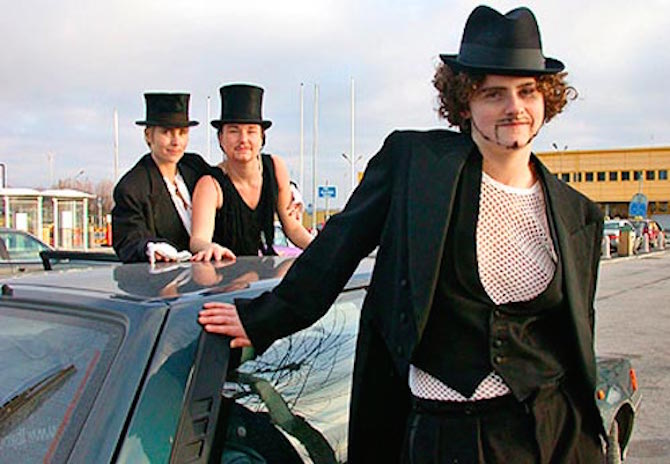Search
To search for an exact match, type the word or phrase you want in quotation marks.
A*DESK has been offering since 2002 contents about criticism and contemporary art. A*DESK has become consolidated thanks to all those who have believed in the project, all those who have followed us, debating, participating and collaborating. Many people have collaborated with A*DESK, and continue to do so. Their efforts, knowledge and belief in the project are what make it grow internationally. At A*DESK we have also generated work for over one hundred professionals in culture, from small collaborations with reviews and classes, to more prolonged and intense collaborations.
At A*DESK we believe in the need for free and universal access to culture and knowledge. We want to carry on being independent, remaining open to more ideas and opinions. If you believe in A*DESK, we need your backing to be able to continue. You can now participate in the project by supporting it. You can choose how much you want to contribute to the project.
You can decide how much you want to bring to the project.

1928: A cargo of cigars
“…if the spirit had examined the contents of her mind carefully, it would not have found something highly contraband for which she would have had to pay the full fine” (Virginia Woolf, Orlando).
Travelling can be an act of reaffirmation of the subject related to knowledge: the line “I read, much of the night, and go south in the winter”, ends the first verse of T.S. Eliot’s The Wasteland. On the way the “I” can take charge of biological rhythms (sleep and wakefulness) and seasonal ones (summer and winter) and impose culture over nature and criteria over territory.
But it may also be the case that the traveller was “unversed in geography, found mathematics intolerable, and held some caprices which are more common among women than men, as for instance that to travel south is to travel downhill.” This is the first sketch of the character of Orlando in Virginia Woolf’s novel. Published in 1928, six years after the poem by her companion in the Bloomsbury Group, the story begins defining the traveller’s consciousness opposed to a poetically masculine or mythopoetically virile imaginary journey. By opting for this intertextual strategy Woolf also parodies the meaning of the quote and the reference that runs through Eliot’s text. She does so by pointing out that textual systems of appeal and reference are integrated in the dynamic of sexuation and during the writing practice they prolong the complicity of the male sex which defines the homosocial spaces of daily life. So the voluntary confusion between knowledge and sexuality, between ignorance of the self and the enigma of geography, constitute the first indication of becoming transgender.
This is the image with which, during the final phase of her transformation, Orlando realises her new identity and the peculiar position in which the Law of Gender has placed her. The description of the crossing of the (male/female) protagonist mainly occurs by boat, and the recently acquired male condition is metaphorically described as a cargo of leeks hidden at the bottom of a suitcase, which have to be hidden from the eyes of the customs officer. It is significant that by taking on the question of gender in relation to the border crossing, Woolf dismissed the possibility of writing a real-time situation and opted instead for a second degree hypothesis; in other words a scene that is anticipated in the mind of the narrator and which invokes an allegorical figure (a “spirit” which is clearly fixed in all periods of time). This process has to be understood in the light of the theory of the unification of the sexes, which the author toys with in A Room of One’s Own. This theory is not biologically or corporally based but form part of a phenomenological focus of gender as a system of perceptions and senses where the androgynous mind appears like a soundboard which “resonant and porous; that it transmits emotion without impediment. Androgyny, then, is initially formed in opposition to masculinity and only afterwards in relation to the stability of gender. The differences in culture of the senses appear, from that point of view, as the basis of gender asymmetry in the literary field. This way of looking at sexual otherness would have a major influence on several creative projects dealing with the scenario of identity and borders.
1969: At the transit zone
While listening to the the fugue effect of the splendid final chorus of the tune of Alitalia ove the airport megaphone, my mind began to lose, while not my sense of identity itself, a piece of information which, although less personal to me than my identity, was, in some respects, more vital. (Brigid Brophy, In Transit: An Heroi-Cyclic Novel)
The representation of the airport as a place of sexual identity becomes blurred and is reconsidered, becoming a central motif en the processes of literary renewal that took place at the end of the sixties and the mid-seventies. The main example if this can be found in Irish writing and it is represented in the (anti)novel In Transit (1969), where the narrator suffers a sudden attack of gender amnesia in the airport waiting room which this time extends to the sexuated dynamic of producer-consumer relations: “But I, reader, do not know what your sex is either”. In Transit is a field extension of the descriptive mode introduced in Orlando where the different thinking is formulated as a sonically hypersensitive means of perception (it is the music that causes sexual disorientation) that is also empirically perplexed (now it is not only the customs officer who is wrong but also the traveller who is incapable of recognising their own sexuation).
Brigid Brophy’s androgynous narration and unknowingness has a sister text in English literature: Between by Christine Brooke-Rose, which was published some months later and deals with very similar themes, with the passenger in transit also as the being of difference (“between doing and not doing the body floats”), as well as the use of interior polyglot monologue (“Questo salvagente one day will have no frontiers and no passports per assistere anche una persona priva de conoscenza…”). As far as American literature is concerned, there is a more incidental yet no less important way of dealing with this matter in Long Talking Bad Conditions Blues (1979) by Ronald Sukenick. Here, the interior monologue sketches a scene of “sexual impasse” defined from a set of “new exits from the terminal of language”.
In these writings about transition the impact of post-structuralist conception of writing, which conceive of language as a difference stripped of its original reference, is clear. This conception is objectified in the characterisation of the passenger in transit as a being of language in difer(a)nce: a pristine, dispossessed, interrogative and often comically confused being. The central figure of the process is pathetic fallacy, the creation of a mood in a place. The spaces conceived for waiting are coded as places of disinterested meditation. Here we should distinguish between the two modes of waiting that correspond to each epistemological mode. There is the existential wait, frequently represented in the arts as waiting in vain: the Godot who will never arrive, the author who gives the characters no meaning. “What am I doing here?” and “Who am I?” are the interrogative orders that govern this wait as itinerancy. Mabel Burin pointed out that in gender theory essentialist views on the construction of subjectivity are articulated from these models of questioning of being. They are superimposed on the new questions raised in the framework of constructionism, which Burin sums up as “Who am I being?” (to which we could add “What makes me the here?”) The unknowingness novels are dis-orientated by this series of questions, making the gender inquisition the hallmark of pathetic fallacy.

2003: A cigar and a tiger in Stansted airport
When you fly to London, if you are not a British citizen they give you a landing card and you have to mark whether you are a man or a woman. I never put it, I haven’t done it since 1995. And what do they say? Nothing! So now, if I have time, I say to them, “Did you notice I didn’t put if I was a man or a woman? What is you policy in these cases? How do you know I am who I say I am?”)
Interview with Del LaGrace Volcano in: Elisabeth Massana (Ed.), Glamur i resistència.
The testimony of photographer and variable gender activist Del LaGrace Volcano on his experiences of crossing the border in general, and at Heathrow in particular, is illustrative of this logic of identity. Just like any other passenger, Volcano is subjected at the customs desk to a two-part test. The first part is the interjection (“oi, you!”), which is there to make the subject a being tied to a rule which, even before it is spoken, is present in the authoritarian call. The second is the questionnaire, the strength of which lies in its capacity to frame the subject in a template of questions defined jointly by local legislation, chance and triviality.
The response to this situational institution takes place via a tape recorder, the instrument that Burroughs conceptualised as anti-repression technology par excellence. “When I cross the border I secretly record the conversation with the control police”, Volcano explains; what happens next is a manifestation of a single person against the established authority which, when questioned itself, is obliged to respond to a rule that it unlikely to know, whose arbitrariness is clear in the presence of exception. In this ridiculed indexal scene the discordance between the subject and the index is no less important than the lack of complementariness between the police and the rule. The exception –whether intersexual, as in Volcano’s case, or other – does not destroy the rule and in fact could even reinforce it through the routine acknowledgement of difference; on the other hand the rule starts to be undermined when the body that has been there to uphold it, the police, is obliged to ask itself why it has been put in place. In the scenario of reverse questioning Volcano turns the guardian into the susceptible subject who, always inadequately, tries to establish the rule.
The airport action forms part of a project on the theatre of identity2 in the terminal and is most complete in the Airportformance (2002-2004) series. It involves a set of interventions and documentary photographs at the London airport of Heathrow and Stansted, along with the Sturup aerodrome in Sweden. Assisted by several collaborators, Volcano combined different pieces of clothing and rubber masks to create situations showing the institutive nature of the drama of transit: Frankenstein welcoming the traveller or a series of obscene posters in the arrivals area. The most powerful shows a couple made up of a drag king complete with gold chain and cigar and an actor wearing a tiger mask. At customs control they may well have sung that song by Hidrogenesse, which is an exact representation of the performance genre, and which doesn’t say “I am a tiger” or “the tiger is a costume of masculinity” but “I am a tiger costume”.

PhD in Humanities from the University Pompeu Fabra, currently teaching Contemporary Art at the UPF Education Abroad Program, as well as on the Art module of the Master in Cultural Journalism, UPF Barcelona School of Management. He has published with Anagrama the essays Afterpop Homo Sampler, €®O$ (Anagrama Prize ) and Emociónese así (Barcelona Prize).
"A desk is a dangerous place from which to watch the world" (John Le Carré)